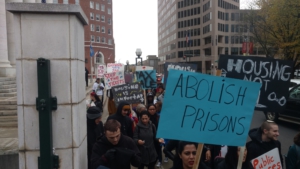On Nov. 1, scores of people gathered in New Haven, Conn. for a march and rally aimed at combating the criminalization of homelessness and bringing attention to the scope of the problem. Entitled “Housing Not Jails,” the march was led by members of the homeless community, who used the event to bring attention to the multitude of issues that homeless people face, not just in New Haven, but across the country.
for a march and rally aimed at combating the criminalization of homelessness and bringing attention to the scope of the problem. Entitled “Housing Not Jails,” the march was led by members of the homeless community, who used the event to bring attention to the multitude of issues that homeless people face, not just in New Haven, but across the country.
The group published a list of demands calling for an immediate end to the criminalization of homelessness and for housing and social services for every homeless person living in New Haven. They also demand levying of taxes on New Haven’s Yale University to help residents of New Haven. Indeed, many of the speakers at the rally laid a large amount of responsibility for the city’s homeless problem at the feet of Yale University, which adjoins a number of neighborhoods that have been hard-hit by foreclosure and gentrification. One speaker mentioned the university’s endowment, which stands at $25 billion, second only to Harvard.
One issue discussed by a number of speakers at the march was the lack of availability to mental health and substance abuse resources for the city’s most vulnerable populations. A number of speakers talked about barriers to accessing these services, even after being remanded to them by courts. One mother spoke of her daughter being mandated to complete a substance abuse program, yet being unable to actually do so because she only smoked marijuana and did not use any “hard” drugs.
In New Haven, the homeless population is under attack from the police like never before.
As Andrew, who was formerly homeless, said, “I’ve seen the brutality from the police … [I’ve been] woken up in the middle of the night by police and threatened with jail,” and another speaker complained about “the harassment just for being homeless … we don’t do anything wrong, but we still get taken and harassed.” The organizers point to the criminalization of panhandling being an issue, and one speaker asked, “How is it possible that in this New Haven that I know that we see parking meters saying not to donate directly to the homeless and to donate there instead? How can you tell me that that is morally right?”
Indeed, the push to discourage people from giving to panhandlers is nationwide, and it’s having a negative effect on homeless people and others who rely on panhandling. A common theme of these anti-panhandling campaigns is a belief that homelessness is a result of laziness or another moral failing, and a message reiterated by speakers at the rally was that homelessness is a lot closer for most people than they’d like to admit.
After convening outside a church on the outskirts of downtown, the rally turned into a march traveling down Chapel Street to City Hall, to the state courthouse, then to the First Methodist Church where immigrant Marco Reyes is seeking shelter from deportation, and ending at a community dinner at the Yale University Catholic center.
In New Haven, the homeless community has been empowered to fight for their rights and Elm City residents have shown their support. This week’s action did an admirable job of framing the problem and presenting it to the greater New Haven community laying the groundwork for real, positive change. This march was just one part of an effort around the city to fight for the rights of homeless people. We call for a system that safeguards the human right to housing and a job!





